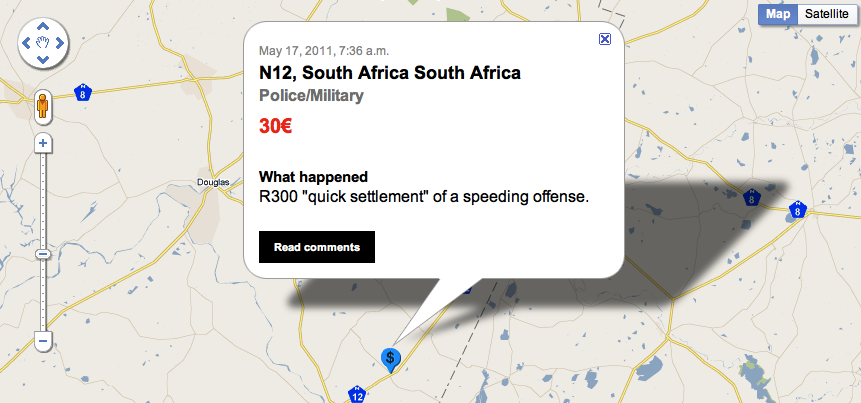A Foursquare game for bribes, a Facebook page for traffic violators, and an app where police officers help reveal speed traps are powered by transparency--and shame.

Mark Zuckerberg might serve as a better model than James Bond in the fight against corruption. Clever social media developers are illuminating shady activity.
In India, police ask Facebook users to post pictures of the unruly drivers that have turned their overcrowded streets into a gauntlet. A Foursquare-like geolocation app called BribeSpot allows users to "check in" to an exact location where they've been coerced into bribery. And an app-maker alerts drivers to once-hidden speed traps--with full cooperation from cops.
On the Internet, fighting crime is more about shame and awareness than punishment and secrecy.
Corruption
The "Arab Spring" is one of the most recent phenomenon sparked in part by the new transparency--leaked cables revealed unequivocal admissions of corruption in Tunisia and kicked off international Arab protests. Geolcation app, BribeSpot, is the latest in a series of crowdsouced corruption reporting tools which hopes to leverage that same emotional power of awareness.
After users check in to the location were the bribe was coerced, a bright big dollar sign is overlaid on a Google Map, and details on the offense are just a click away.

BribeSpot then offers up graphs and statistics for tracking trends and comparing countries.
Like the first months (or years) of many social media platforms, the site is ridiculously thin on users (there are certainly more than 200 worldwide incidences of bribery ... and Africa is no poster country for law and order). At least one earlier bribe tip website, I Paid A Bribe, has already amassed thousands of reports, giving confidence that the genre of whistle-blowing sites has a latent audience eager to report.
Either way, most bribers might fear reporting engaging in illegal activity, paralyzing the low reporting rate to numbers far below the actually number of incidences. In response, India's chief economic advisor, Kaushik Basu, made the bold recommendation to legalize bribe giving. Taking a cue from game theory, the quantitative way economists predict whether individuals will cooperate or compete, he writes,
The reasoning is that once the law is altered in this manner, after the act of bribery is committed, the interests of the bribe giver and the bribe taker will be at divergence. The bribe giver will be willing to cooperate in getting the bribe taker caught. Knowing that this will happen, the bribe taker will be deterred from taking a bribe. [PDF]
To date, the intended benefits of bribe transparency is theoretical: Some governments, especially the worst ones, may be so entrenched in corruption that there's nothing left to shame. The effects of WikiLeaks, however, were a shock, and new technologies are just beginning to experiment with how else awareness can be effective.
Facebooking Traffic
Policing one of the most densely populated cities on Earth is an unwieldy task. The anonymity of large crowds combined with the expletive-drenched frustration of stalled traffic results in cars parked on crosswalks, dangerously illegal turns, and more. So New Delhi traffic officers turned to a modern-day solution: Facebook.
Concerned motorists are encouraged to upload photos of traffic no-noes to the Delhi Traffic Police fan page, which then tips officers to investigate the accusation. The page is seeing impressive success and has amassed some 60,226 fans. Just three hours before the writing of this article, an update was posted with a picture of a swerving vehicle and this description, "Faulty no plate, completely tinted glasses and very rash driving (zig zag); one can see from the position of the vehicle on the road."
The strategy, in effect, creates a neighborhood watch the size of a city. "[I]t is not only traffic cops they need to worry about," Indian businessman and user of the Facebook page, Vijyan Jain, told the New York Times.
Slowing Down Traffic Voluntarily
In the United States, some traffic officers have formed an unlikely partnership with what would seem like a subversive enemy: an app maker whose tool alerts drivers to speed traps. Authority figures who support the app say it reminds drivers to slow down, especially in the most dangerous areas (a police officer responds at the 2:35 minute mark in the news video below; the story starts at 0:26).
One officer who agreed to be interviewed by Trapster said he uses the app himself:
I drive within 10mph of the speed limit. Sometimes I may drift up there on the interstates and Trapster usually reminds me to slow it down a notch. I’ve never been pulled over for speeding in the years I’ve used Trapster though!
To be fair, the radical transparency approach has its critics. RIM recently yanked Trapster from its app store (excuse me, App World) at the request of a cabal of powerful senators, including Senate Majority Leader Harry Reid. Critics of India's Kaushik worry that legalizing bribery would morally legitimize corruption and actually have little effect.
The technology is simply too new to have any certain effects. However, the tectonic effects of exposed cables reveals just how surprisingly effective transparent technologies can be.
No comments:
Post a Comment